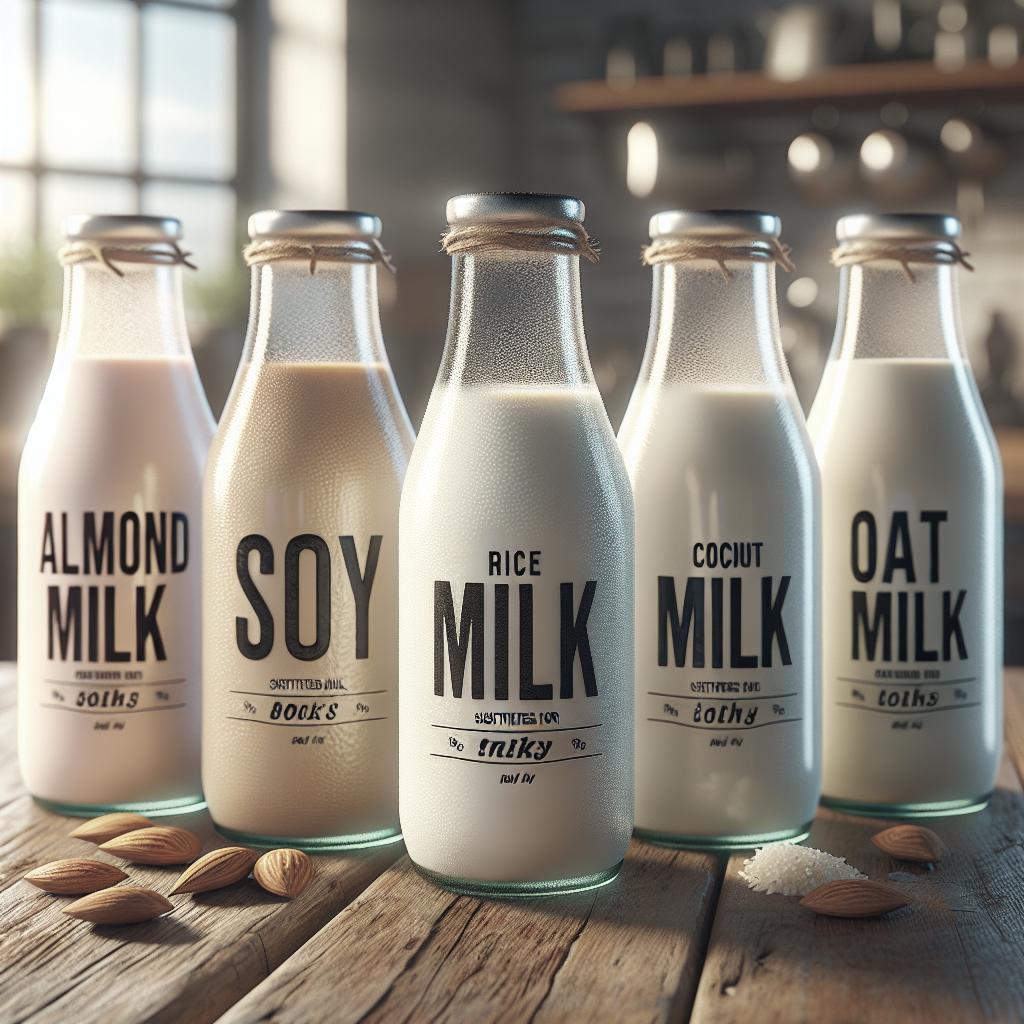“`html
Best Substitutes for Dairy Milk: Exploring Plant-Based Alternatives
As the demand for plant-based diets continues to rise, so does the interest in dairy milk alternatives. Whether you’re lactose intolerant, vegan, or simply looking to diversify your diet, there’s a plethora of options available. This blog post explores the best substitutes for dairy milk, taking into account nutritional content, taste, and versatility. From soy to quinoa milk, we’ll dive into the benefits and drawbacks of each option. Additionally, we’ll provide tips on what to consider when choosing a milk substitute, helping you make an informed decision for your health and lifestyle.
Why You Might Want a Substitute
There are several reasons why someone might seek alternatives to traditional dairy milk. Firstly, lactose intolerance affects a significant portion of the population, making it difficult for them to digest regular milk without discomfort. Plant-based milk options are lactose-free, making them an ideal choice for such individuals.
Moreover, the rise in veganism and environmental concerns has encouraged people to seek out plant-based diets. Dairy farming can contribute to a sizable carbon footprint, leading many environmentally conscious consumers to explore sustainable alternatives. Health considerations also play a role, as plant-based milk often contains fewer saturated fats compared to dairy milk.
1. Soy Milk
Soy milk has long been a staple in the world of dairy substitutes. Made from soybeans, it’s one of the most nutritionally comparable to dairy milk, offering a good amount of protein that can match or even surpass low-fat cow’s milk. It has a creamy texture and neutral taste, which makes it a versatile choice for cooking and baking.
However, some people may have allergies to soy, which can restrict its consumption. Additionally, concerns about genetically modified soybeans may deter some individuals. Nevertheless, non-GMO and organic soy milk options are readily available on the market, catering to health-conscious consumers.
2. Almond Milk
Almond milk is a popular choice due to its subtle, nutty flavor. It’s low in calories, which can be advantageous for those looking to manage their weight. Almond milk is simple to produce at home, providing a fresh, homemade alternative to store-bought versions, which often contain additives and preservatives.
On the downside, almond milk is typically lower in protein compared to dairy milk and some other plant-based options. Additionally, almonds require significant water resources to cultivate, raising sustainability concerns amidst growing environmental awareness.
3. Coconut Milk
Coconut milk, derived from the flesh of coconuts, is known for its rich, creamy consistency and naturally sweet taste. This makes it a beloved choice for curries, soups, and desserts. Coconut milk provides a variety of nutrients, including medium-chain triglycerides (MCTs), which are believed to boost energy and brain function.
It’s important to note that coconut milk is relatively high in saturated fats. While they are plant-based, moderation is still advised. Additionally, the strong flavor of coconut milk may not be suitable for all recipes, limiting its versatility compared to more neutral-tasting substitutes.
4. Oat Milk
Oat milk has surged in popularity due to its creamy texture and naturally sweet flavor. It’s an excellent source of carbohydrates and fiber, which can benefit digestive health. Oat milk froths well, making it a favorite among baristas and coffee enthusiasts.
While oat milk is higher in carbohydrates, it is lower in protein than cow’s milk. Additionally, those with gluten intolerance should ensure they choose a certified gluten-free oat milk to prevent any adverse reactions. Many commercial brands also fortify oat milk with vitamins and minerals, enhancing its nutritional profile.
5. Rice Milk
Rice milk, made from milled rice and water, is known for its light, almost watery texture and sweet flavor. This makes it a popular option, especially for those with multiple food allergies as it is typically free from nuts and gluten.
Although low in fat, rice milk is higher in carbohydrates than other plant-based milks and lacks significant protein content. Additionally, certain brands may add sweeteners or flavorings, so it’s important for consumers to check labeling carefully.
6. Cashew Milk
Cashew milk, though not as common as almond or soy, offers a smooth, creamy consistency that is beloved by many. It can be easily incorporated into both sweet and savory recipes due to its mild flavor profile. Cashew milk is naturally low in calories.
Like many nut-based milks, cashew milk is low in protein. Additionally, those with nut allergies should steer clear of this option. Homemade versions retain more fiber and nutrients, but commercial variations are often fortified with vitamins.
7. Macadamia Milk
Macadamia milk is a relatively new entry into the plant-based milk scene. It is exceptionally creamy and lends a luxurious texture to beverages and recipes. It is naturally low in carbohydrates and sugar, making it a choice for those seeking a lower-carb option.
However, macadamia milk tends to be more expensive than other plant-based milks, and it may not be as readily available in stores. As with cashew milk, those with nut allergies should avoid this option.
8. Hemp Milk
Hemp milk is derived from the small seeds of the hemp plant, which are known for being rich in omega-3 and omega-6 fatty acids. It has a smooth texture and nutty taste, making it a good addition to cereals and smoothies.
Though hemp milk is relatively low in protein compared to soy or cow’s milk, it provides essential fatty acids that are beneficial to heart health. It is also an option for those with soy or nut allergies, and it’s environmentally friendly choice due to the sustainability of hemp cultivation.
9. Quinoa Milk
Quinoa milk, made from the nutritious pseudo-grain quinoa, is a newcomer to the dairy alternative scene. It’s a complete protein source, containing all nine essential amino acids—a rarity among plant-based substitutes.
While rich in nutrients, quinoa milk has a distinct, slightly nutty flavor that may not appeal to everyone. It’s also one of the more expensive dairy alternatives, primarily due to the higher cost of quinoa.
What to Consider When Substituting
When choosing a dairy milk substitute, consider your dietary needs and taste preferences. Assess the protein and calcium content if these nutrients are essential in your diet. Many plant-based milks are fortified with calcium, vitamin D, and other nutrients to enhance their nutritional profile.
Consider also the flavor and texture preferences you have for your beverages and meals. Some options, like coconut and almond milk, offer distinct flavors, while others like soy or oat milk provide a more neutral taste. Finally, sustainability and environmental impact might influence your choice, guiding you toward eco-friendly solutions.
The Bottom Line
Plant-based milk options offer a diverse array of flavors and nutritional benefits, making them suitable for various dietary needs and lifestyle choices. While it’s essential to find an option that suits your preferences, enriching your diet with a variety of these substitutes can provide a well-rounded nutritional benefit.
Ultimately, whether it’s for health reasons, environmental concerns, or taste preferences, the availability of these milk alternatives proves that we are living in an era of countless choices. Choosing the right substitute involves balancing personal health needs with taste preferences and environmental consciousness.
| Dairy Milk Substitute | Pros | Cons |
|---|---|---|
| Soy Milk | High in protein, versatile | Allergen, GMO concerns |
| Almond Milk | Low in calories, nutty flavor | Low in protein, sustainability concerns |
| Coconut Milk | Creamy, rich in MCTs | High in saturated fats, strong flavor |
| Oat Milk | Creamy, high in fiber | Low in protein, check gluten-free |
| Rice Milk | Allergy-friendly | Low in protein, high in carbohydrates |
| Cashew Milk | Smooth, creamy | Low in protein, allergen |
| Macadamia Milk | Very creamy, low-carb | Expensive, allergen |
| Hemp Milk | Rich in fatty acids | Low in protein, distinct taste |
| Quinoa Milk | Complete protein | Distinct taste, expensive |
“`


